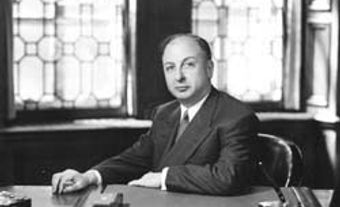Corliss Powers Walker
Corliss Powers Walker, "C.P.," theatre manager and impresario (b at Poultney, Vermont 19 September 1853; d at Winnipeg 24 September 1942). The son of Jason Walker, an Episcopalian minister who moved with his family from New England to Rochester, Minnesota in the early 1860s, Walker was trained as a printer. He established a successful printing business in Fargo, North Dakota, with his brothers and managed it until, in the 1890s, he shifted his attention to theatre management.
In the 1890s, Walker became manager of the Fargo Opera House, and acquired theatres in Grafton and Grand Forks, North Dakota, and Crookston and Fergus Falls, Minnesota. In 1897 he leased the former Bijou Theatre at Notre Dame and Adelaide in Winnipeg, Manitoba, remodelled it, renamed it the Winnipeg Theatre, and moved to Winnipeg to manage it personally. The Winnipeg Theatre became the leading theatre in Walker's Red River Valley (or "Breadbasket") mini-circuit of theatres, located along the Northern Pacific Railway route from Fargo to Winnipeg. Walker's circuit took advantage of the comprehensive touring system set up (1895) in New York by the newly established Theatre Syndicate.
Walker operated the Winnipeg Theatre and other theatres in his circuit twelve months a year. The combined market offered by this string of theatres enabled him to book the entire program of attractions offered by the Syndicate for western touring. This gave Walker a virtual monopoly of top shows and touring stars. While New York attractions provided the core of Walker's programming, he filled out the year with independent attractions (those not explicitly blacklisted by the New York office), repertory companies (Shakespeare, Modern and Opera), "Uncle Tom" shows, minstrel shows, amateur theatricals, locally written musicals, touring concert artists, military bands and symphony orchestras. As he acquired more theatre holdings in Western Canada and formed alliances with other mini-circuit operators in the western US, Walker became the booking agent for theatres throughout the northwestern US and Canada, often mounting and financing productions himself.
In the wake of Chicago's disastrous Iroquois Theatre fire (December 1903), an attempt was made to close the second-story, wooden Winnipeg Theatre for fire code violations. Walker held off efforts to put him out of business until he could complete construction of a modern, steel-frame, fire-proof theatre, the Walker, which opened in 1907 on Smith Street at Notre Dame (seeWALKER THEATRE; THEATRE DESIGN TO 1950).
In 1910, Walker broke with the Syndicate and joined with other northwestern circuit managers in support of the Shubert Brothers' challenge to restrictive practices of the theatre monopoly. In 1911 the Syndicate capitulated, allowing their clients to book Shubert and other independent shows, thus making all top touring attractions universally available. Walker renewed his contract with the Syndicate but pursued an open booking policy.
In the 1920s American touring business declined and Walker featured extended bookings of major British repertory companies. By the early 1930s movie interests made theatre buildings unavailable to live theatre and cross-Canada tours by British companies became impossible. Walker attempted to establish a local repertory stock company but the venture failed. In 1933, at the age of 80, he closed the Walker Theatre and retired from active theatre management. The Walker Theatre building was seized by the city of Winnipeg for taxes in 1936.

 Share on Facebook
Share on Facebook Share on X
Share on X Share by Email
Share by Email Share on Google Classroom
Share on Google Classroom


